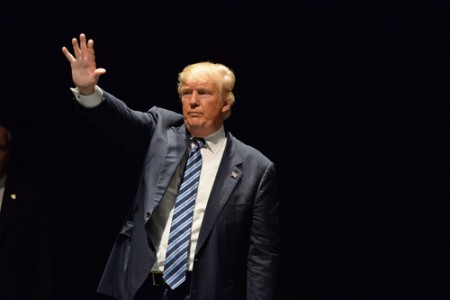Suit alleges Trump endorsements misled consumers and defrauded investors

Photo of President Donald Trump from Shutterstock.com
A would-be class action suit filed against President Donald Trump alleges he engaged in a scheme to defraud investors by promoting three companies that charged people to sell their products and learn about business opportunities, while failing to disclose the financial risk of the buy-in.
According to the lawsuit, Trump didn’t disclose that he was “lavishly paid” for the endorsements, and instead led consumers to believe that his backing was based on due diligence, inside information and personal experience with the companies.
The suit claims Trump and other defendants in the alleged “Trump enterprise”—namely, the Trump Organization and children Donald Trump Jr., Eric Trump and Ivanka Trump—violated wire fraud laws in carrying out a racketeering conspiracy. The suit also alleges violation of state laws barring consumer fraud, unfair-competition laws and unfair trade practices. Other counts allege common law fraud and negligent misrepresentation.
Publications covering the suit include the New York Times, Bloomberg, the Washington Post, Politico and Courthouse News Service.
The four working-class plaintiffs in the suit lost hundreds or even thousands of dollars as the Trumps made millions through the fraud, the suit alleges.
The suit is peppered with photos of Trump in posh surroundings, said in the suit to illustrate his effort to build his image as a very rich man skilled in the world of business. Other photos show Trump endorsing the companies or appearing at their events.
The four plaintiffs use the pseudonyms of Jane Doe, Luke Loe, Richard Roe and Mary Moe. They are represented by lawyers Roberta Kaplan and Andrew Celli Jr., who said they are seeking anonymity for their clients because of security concerns in today’s heated political environment.
Plaintiff Jane Doe is a hospice caregiver in California who paid $499 to register with one of the companies, ACN, then spent thousands of dollars to attend corporate events, the suit says. After two years, she had earned only $38.
ACN, also known as American Communications Network, sold desktop videophones that were for many years a central component of its sales strategy. But the product “was doomed almost from the start,” the suit alleges. The phone required an internet connection to work, it could only be used to make video calls to other ACN videophones, and it couldn’t be used absent a subscription to ACN utility services.
Trump was paid for his endorsement through speaking fees and payments for ACN appearances on Celebrity Appearance, the suit said.
The other companies endorsed by Trump were the Trump Network, which marketed vitamins; and the Trump Institute, which offered training seminars to learn the secrets of real estate. Trump received royalties and fees contingent on other promotional activities for Trump Network endorsements, and he received franchise fees and secret lump-sum payments for promoting the Trump Institute, the suit says.
The lawsuit is funded by the Tesseract Research Center, which is chaired by a former asset-management executive who donates to Democratic candidates.
The Trump Organization said in a statement that the suit was filed by the “political activist attorneys” before the midterm elections, and it was just another effort by the president’s political opponents to advance a political agenda through the courts.
“Not only are the allegations completely meritless, but they all relate to events which took place nearly a decade ago and are well past the statute of limitations,” the company said.



